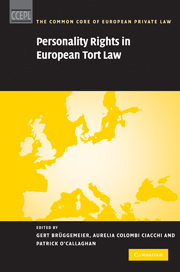Book contents
- Frontmatter
- Contents
- List of contributors
- National reporters
- General editors' preface
- Preface
- Editorial note
- List of abbreviations
- Part I Mapping the legal landscape
- Part II Case studies
- 4 Case 1: The corrupt politician
- 5 Case 2: Convicted law professor
- 6 Case 3: The paedophile case
- 7 Case 4: An invented life story?
- 8 Case 5: A former statesman's family life
- 9 Case 6: A satirical magazine
- 10 Case 7: A snapshot of a person
- 11 Case 8: A paparazzo's telephoto lens
- 12 Case 9: Naked.Little.Girl.Com
- 13 Case 10: The late famous tennis player
- 14 Case 11: The popular TV presenter
- 15 Case 12: Copied emails
- 16 Case 13: Brigitte's diaries
- 17 Case 14: Tape recordings of a committee meeting
- 18 Case 15: ‘Light cigarettes reduce the risk of cancer’
- 19 Case 16: Doctor's non-disclosure of a foetal disease
- 20 Case 17: WAF – A gang of incompetents?
- Part III A common core of personality protection
- Index
15 - Case 12: Copied emails
from Part II - Case studies
Published online by Cambridge University Press: 06 July 2010
- Frontmatter
- Contents
- List of contributors
- National reporters
- General editors' preface
- Preface
- Editorial note
- List of abbreviations
- Part I Mapping the legal landscape
- Part II Case studies
- 4 Case 1: The corrupt politician
- 5 Case 2: Convicted law professor
- 6 Case 3: The paedophile case
- 7 Case 4: An invented life story?
- 8 Case 5: A former statesman's family life
- 9 Case 6: A satirical magazine
- 10 Case 7: A snapshot of a person
- 11 Case 8: A paparazzo's telephoto lens
- 12 Case 9: Naked.Little.Girl.Com
- 13 Case 10: The late famous tennis player
- 14 Case 11: The popular TV presenter
- 15 Case 12: Copied emails
- 16 Case 13: Brigitte's diaries
- 17 Case 14: Tape recordings of a committee meeting
- 18 Case 15: ‘Light cigarettes reduce the risk of cancer’
- 19 Case 16: Doctor's non-disclosure of a foetal disease
- 20 Case 17: WAF – A gang of incompetents?
- Part III A common core of personality protection
- Index
Summary
Case
The politicians Smith and Jones exchanged emails in which they discussed a planned tax increase and agreed that this plan should be kept secret until after the election. An unknown person at the internet company which ‘delivered’ the emails copied them and sent the copies to a newspaper. The newspaper informs Smith that it plans to publish the emails.
(a) Is Smith entitled to an injunction against the imminent publication of the emails?
(b) Would it make a difference if the conduct of the unknown person constitutes a criminal offence?
Discussions
Austria
Operative rules
Smith cannot initiate any legal proceedings.
Descriptive formants
§ 77 UrhG provides for the protection of letters, diaries and similar confidential records against public reading and publication. Arguably, an email may be regarded as a similar confidential document, like a letter, since it serves the same purpose.
Only documents in written form are protected by § 77 UrhG. An email fulfils this criterion. Although its content is saved, transmitted and presented electronically, it can still be read from the monitor. As a consequence, § 77 UrhG is directly applicable.
§ 77 UrhG only prohibits the dissemination of confidential documents if the ‘legitimate interests of the writer are affected’ (cf. § 78 UrhG and Cases 7 and 10). The honour and privacy of an individual are undoubtedly ‘legitimate interests’.
- Type
- Chapter
- Information
- Personality Rights in European Tort Law , pp. 433 - 456Publisher: Cambridge University PressPrint publication year: 2010



